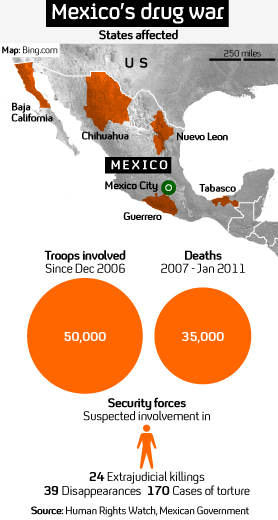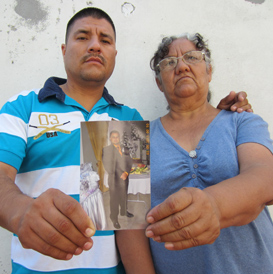Authorities commit ‘human rights abuses’ in Mexico drug war
Mexico’s security forces are committing grave human rights abuses in their desperate fight against drug cartels, a new report alleges. Channel 4 News looks into the country’s “war on drugs”.

Five years ago, Mexico‘s President Felipe Calderón declared war on organised crime and drugs.
Since then, between 35,000 and 40,000 people have died in a dramatic escalation of violence as the authorities attempt to tackle the power of the country’s drug cartels using the military and the police.
The government says that 90 per cent of these victims were criminals. But a new report by Human Rights Watch – Neither Rights Nor Security: Killings, Torture and Disappearances in Mexico’s ‘War on Drugs’ – raises doubts about these claims.

Through research in five of Mexico‘s most violent states, the organisation has found evidence which strongly suggests the participation of security forces in more than 170 cases of torture, 39 “disappearances”, and 24 extrajudicial killings. Human Rights Watch (HRW) told Channel 4 News that its research indicated that the vast majority of these victims had no connection with organised crime.
José Miguel Vivanco, Americas director at HRW, said: “Instead of reducing violence, Mexico’s war on drugs has resulted in a dramatic increase in killings, torture, and other appalling abuses by security forces, which only make the climate of lawlessness and fear worse in many parts of the country.”
Moreover, Human Rights Watch suggests that the abuses are not being properly investigated, with perpetrators allowed to walk free.
While military prosecutors have opened 3,671 investigations into human rights violations by soldiers, only 34 soldiers – 0.9 per cent – have been charged with any crime relating to these alleged violations. And only 15 soldiers – 0.4 per cent – were convicted, the report finds.
Drug ‘war’
More than 50,000 soldiers as well as thousands of members of the navy, the federal police and state and local police are involved in the “war” – despite what HRW describes as “the military’s long track record of abuse and impunity”.
The Mexican government is confronting cartels that have committed horrific crimes against officials and civilians alike. But in responding, security forces need to be held to a different standard. Human Rights Watch
Its report found that forces are systematically using torture to obtain forced confessions from detainees, or information about cartels. It also has evidence that soldiers and police have carried out “disappearances” and extrajudicial executions – and in many cases, taken steps to conceal their crimes.
The report also suggests complaints are ignored. In the five states, from information provided by state prosecutors, it found hundreds of complaints of torture and cruel, inhuman or degrading treatment. But not a single official in these states has been convicted on charges of torture.
Mr Vivanco said: “These abuses are almost never adequately investigated, yet government officials routinely dismiss the victims as criminals and discount their allegations as false. As a result, the victims and their families are left with the burden of doing the investigations themselves to clear the names of their loved ones.”

One victim’s story
On June 28, 2011, the navy raided the home where René Jasso Maldonado, 26, lived with his parents and brother. Without arrest orders or explanation, the 10 armed officers dragged taxi driver Jasso out of the house, loaded him into a military vehicle, and drove away.
His family have not seen him since, despite lodging legal appeals to know his whereabouts. The navy and other security forces deny any knowledge of René’s detention.
His mother, María del Socorro Maldonado Lira, and brother, Oziel Jasso Maldonado (pictured left), say no progress has been made in finding their relative, or in holding anyone from the navy responsible for his disappearance. (Human Rights Watch)
Mr Vivanco said: “The Mexican government is confronting cartels that have committed horrific crimes against officials and civilians alike.
“But in responding, security forces need to be held to a different standard – not only because upholding rights is the correct thing to do, but also because it’s critical for ensuring that public security efforts succeed.”
On Wednesday, HRW presented its damning report to the Mexican government. It wants urgent action.
Mr Vivanco told Channel 4 News that the talks went well, and a statement from the government confirmed that a joint working group will be set up to analyse the contents of the report.
Describing the meeting, the statement read: “President Calderón stressed that the main threat to Mexicans’ human rights are criminals… The government is therefore ethically and legally obliged to use every means at its disposal to reinforce the presence of the authorities in communities with the highest incidence of rivalry between criminal gangs.”
However, the statement stressed: “He [the president] added that the full respect for fundamental rights is an essential element in both the consolidation of Mexican democracy and the construction of genuine, lasting security…On President Calderón’s initiative, a joint working group was set up to analyse the content of this document [the HRW report].”
Mr Vivanco said: “When we explained he has the power to eradicate these types of atrocities committed by the security forces with impunity, the president engaged with us. I think he was shocked by our findings.”
However, the key issue is what happens next.
“It’s an important development but really this is such a tough issue, the violence by the cartels is so serious and the abuses by security forces are so severe, that it is urgent the government implements new policies,” Mr Vivanco said.
“We need to be cautious because in human rights the most important thing is practice, but it is an interesting beginning.”